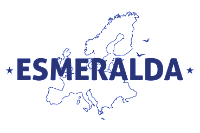 The Horizon 2020 project ESMERALDA released its third newsletter. In this issue you can read about the project activities of the last six months. During this period the project worked towards developing a common understanding within the project of methods for mapping and assessing ecosystems and their services. It also looked at
The Horizon 2020 project ESMERALDA released its third newsletter. In this issue you can read about the project activities of the last six months. During this period the project worked towards developing a common understanding within the project of methods for mapping and assessing ecosystems and their services. It also looked at
how these methods could be used in the context of different ecosystem types, services, “tiers” and spatial scales, cross-referenced to the CICES framework. Finally they introduced a new rubric in their newsletter: ESMERALDA Insider, which will give you the opportunity to learn more about the life, interests and research of our scientists.
Testing ecosystem services mapping and assessment methods across Europe
ESMERALDA participants gathered for a workshop from 26 – 29 September 2016 in Prague, Czech Republic. This workshop was first of a series of five, dedicated to testing methods for mapping and assessment of ecosystem services identified in the second project phase using real-world case studies. ESMERALDA thematic Workshop III was attended by about 60 project partners and stakeholders, who have been directly involved in the case studies, and who provided valuable feedback on the suitability of the methods to be used in different decision-making processes.
Workshop in Nottingham: Towards a Europe-wide integrated framework for mapping and assessment of ecosystem services
With the aim of supporting EU countries in the Mapping and Assessment of Ecosystems and their Services (MAES) process, ESMERALDA held a dedicated workshop to look at and discuss existing methods and how they could be used as part of an integrated assessment. The workshop, which took place from 14 to 16 April 2016 in Nottingham, UK, brought together 51 representatives from countries across Europe, including all ESMERALDA partners, together with potential new consortium members. You can watch the workshop video report here.
ESMERALDA Insider: Meet our scientists!
ESMERALDA Insider is a new project rubric, where every few weeks we will post profiles of our consortium members to give you insights on their research interests and role in the project. Tune in to learn about what motivates scientists in their work, and how are they hoping to contribute to society with their research.
Don’t forget about our country factsheets on BISE
Member states fact sheets with summarised information on MAES activities in each member state are available to view on the Biodiversity Information System for Europe (BISE) website.
European biodiversity and ecosystem service research & innovation strategic science dialogue
The Climate Action and Resource Efficiency Directorate of DG Research and Innovation organised on 29 February 2016 in Brussels a science – policy interface workshop with an emphasis on biodiversity and ecosystem services related themes. The objective of the meeting was to identify synergies between EU funded research and networking projects and actions; foster collaboration on scientific and technical issues, as well as communication and science-policy strategies.
More information on the complete ESMARALDA newsletter, issue 3 can be accessed here.
